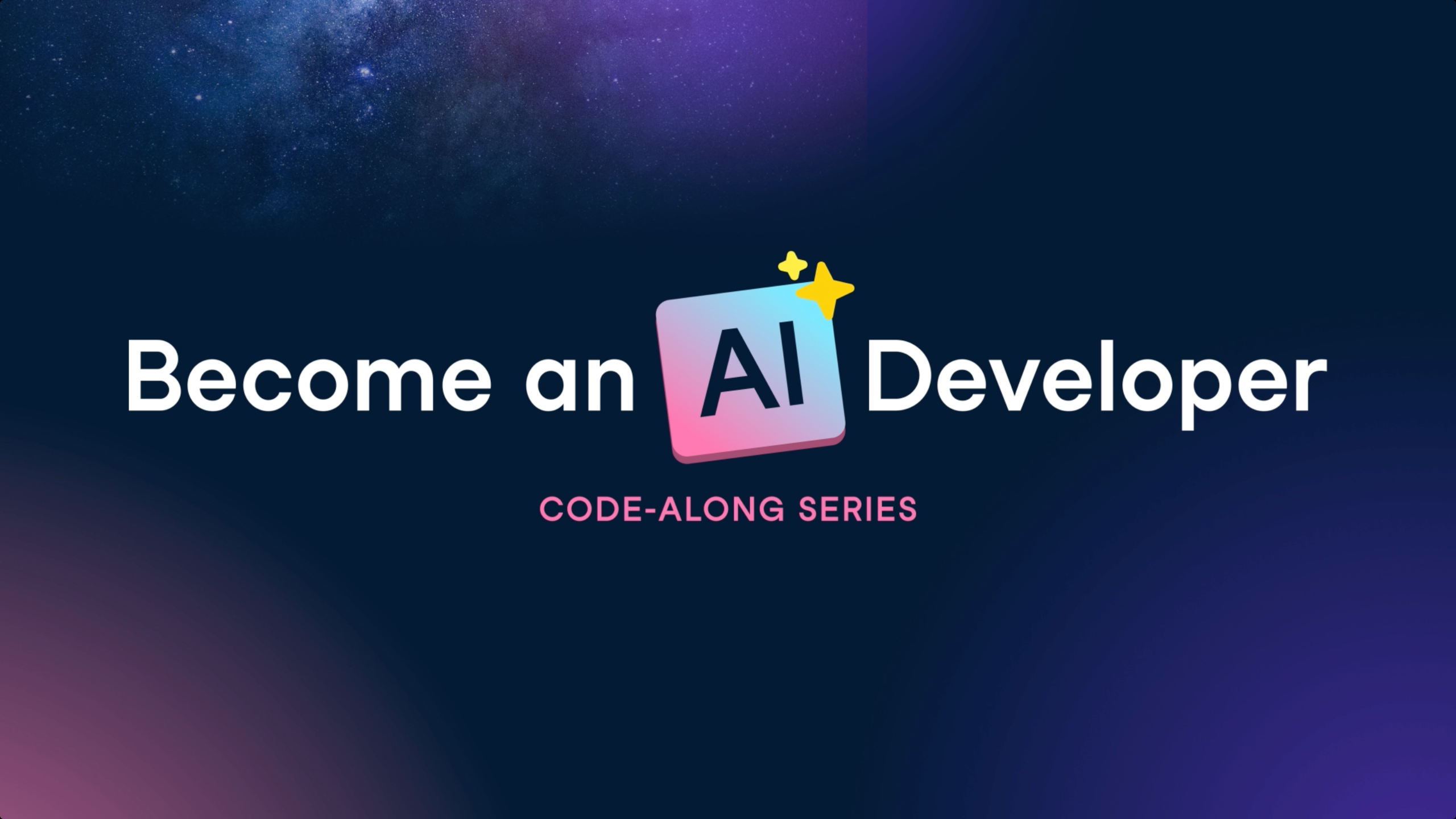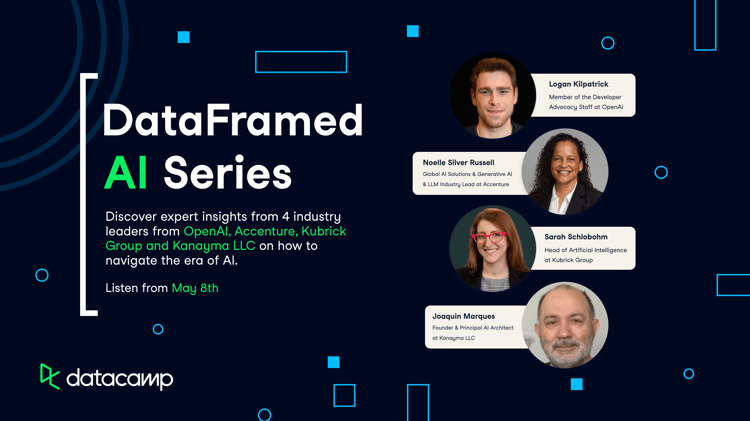At DataCamp, our mission is to empower everyone with the essential data and AI skills they need to succeed in the 21st century. We’ve seen first hand the transformative nature of Generative AI and the importance of enabling individuals and organizations with the toolkit necessary to succeed in AI.
This is why we are thrilled to announce a brand new code-along series "Become an AI Developer." This new code-along series is free for a limited time, and is designed to enable beginners and developers alike with the generative AI skills and tools necessary to start building AI systems today.
Learn key AI skills and start building AI systems today
It is quickly becoming apparent that tools like the OpenAI API, LangChain, Hugging Face & Pinecone are becoming a standard in building generative AI systems. This is why we’ve carefully curated our code-alongs to cover these tools. Our aim is to provide a comprehensive yet accessible learning experience for both beginners and developers alike looking to learn key generative AI skills. Here’s what you can expect:
- Introduction to Large Language Models with GPT & LangChain: Taught by Richie Cotton, Data Evangelist at DataCamp, this code-along will guide you through interacting with GPT via the OpenAI API, engaging in conversations using Python and LangChain, and developing a system for automated data analysis.
- Prompt Engineering with GPT & LangChain: Taught by Olivier Mertens, AI Tech Lead at Microsoft, this code-along will teach you how to craft effective prompts for GPT and LangChain, conduct sentiment analysis, utilize advanced prompts, and filter content with the moderation API.
- Building Multimodal AI Applications with LangChain & the OpenAI API: Taught by Korey Stegared-Pace, AI Cloud Advocate at Microsoft, this code-along will show you how to transcribe YouTube videos with Whisper AI and use GPT to query this content, moving beyond text to integrate other modalities.
- Semantic Search with Pinecone: Taught by James Briggs, Staff Developer Advocate at Pinecone, this code-along will enable you to explore semantic search using Pinecone, including setting up an account, embedding text, and understanding embedding dimensions and distance metrics.
- Retrieval Augmented Generation with the OpenAI API & Pinecone: Taught by Vincent Vankrunkelsven, Senior Software Engineer II at DataCamp, this code-along will delve into retrieval augmented generation using movie data with Pinecone, and structuring prompts to assist knowledge transfer with GPT.
- Building Chatbots with the OpenAI API and Pinecone: Taught by James Briggs, Staff Developer Advocate at Pinecone, this code-along will guide you in creating a chatbot for research paper queries, using retrieval augmented generation and conversational memory with GPT, Pinecone, and LangChain.
- Using Open Source AI Models with Hugging Face: Taught by Alara Dirik, PhD Candidate in 3D Computer Vision at Imperial College London, this code-along will help you navigate the Hugging Face ecosystem to use AI models for text and image data, including a case study on fashion product image captions.
- Building NLP Applications with Hugging Face: Taught by Jacob Marquez, Sr. Data Scientist - Graph Engineer at a Stealth Startup, this code-along will focus on performing sentiment analysis with DistilBERT and exploring dimensionality reduction, clustering and semantic search in the context of fashion data.
- Image Classification with Hugging Face: Taught by Priyanka Asnani, Senior Machine Learning Engineer at Fidelity Investments, this code-along will instruct you on using vision transformer models for image classification and object detection, and improving AI responses with labeled examples.
How to get started?
For a limited time, the Become an AI Developer code-along series is free for everyone. All you need is a free DataCamp account to begin. Simply sign up or log in to your account and start learning. Whether you're a beginner or an experienced developer, these code-alongs were designed by industry-leading experts with accessibility in mind. Get started today and be part of the AI revolution!
Code Along Series: Become an AI Developer
Build AI Systems and develop AI Applications using OpenAI, LangChain, Pinecone and Hugging Face!

FAQs
What will I learn in this code-along series?
Throughout the code-along series, you will learn key generative AI skills, tools, and concepts, including working with the OpenAI API, LangChain, Pinecone, and Hugging Face.
How are code-alongs different from DataCamp courses and projects?
Code-alongs offer a slightly different format than DataCamp courses and projects. Each code-along takes one to two hours to complete and combines an instructor-led video with an open coding environment on DataCamp Workspace.
What are the prerequisite skills for these code-alongs?
We've designed these code-alongs to be accessible by anyone with basic to intermediate Python skills. Make sure to read every code-along's prerequisites.
Is this code-along series free or paid?
We believe in democratizing data & AI education for all. As such, these code-alongs will be free for a limited time. Anyone with a free DataCamp account can take advantage of these code-alongs.
Will I have to pay for the OpenAI API to finish the code-alongs?
Some code-alongs focus on the OpenAI API and will require you to use your debit card to gain an API key. The cost of following all the code-alongs using the OpenAI API will be under 20 US cents per code-along. In certain cases, OpenAI does provide free credit for access to the OpenAI API, but we cannot guarantee their availability.
Where are these code-alongs hosted?
Code-alongs are hosted on DataCamp Workspace, DataCamp's cloud-based Jupyter Notebook IDE.
Will I get a statement of accomplishment once I finish the series?
At the current time, we do not provide statements of accomplishments or certifications for completing the series.



